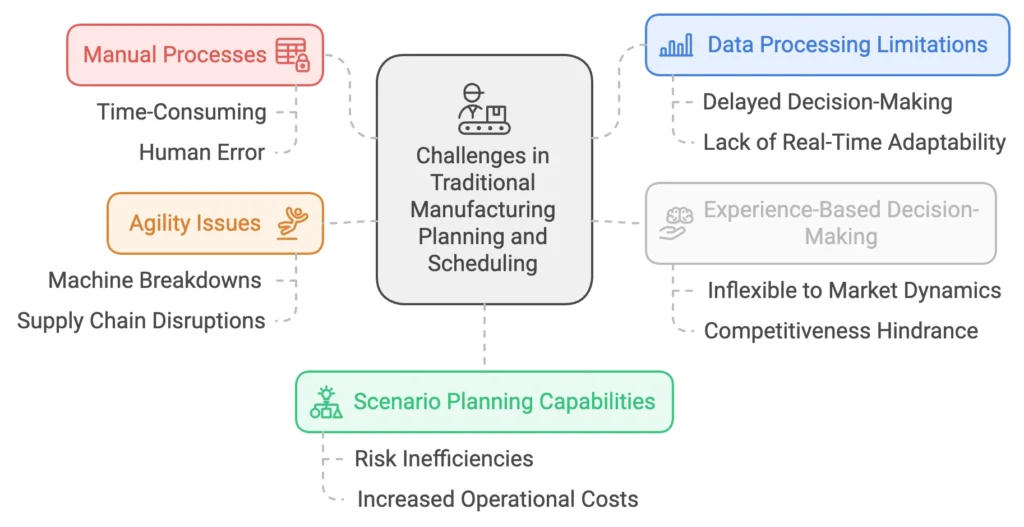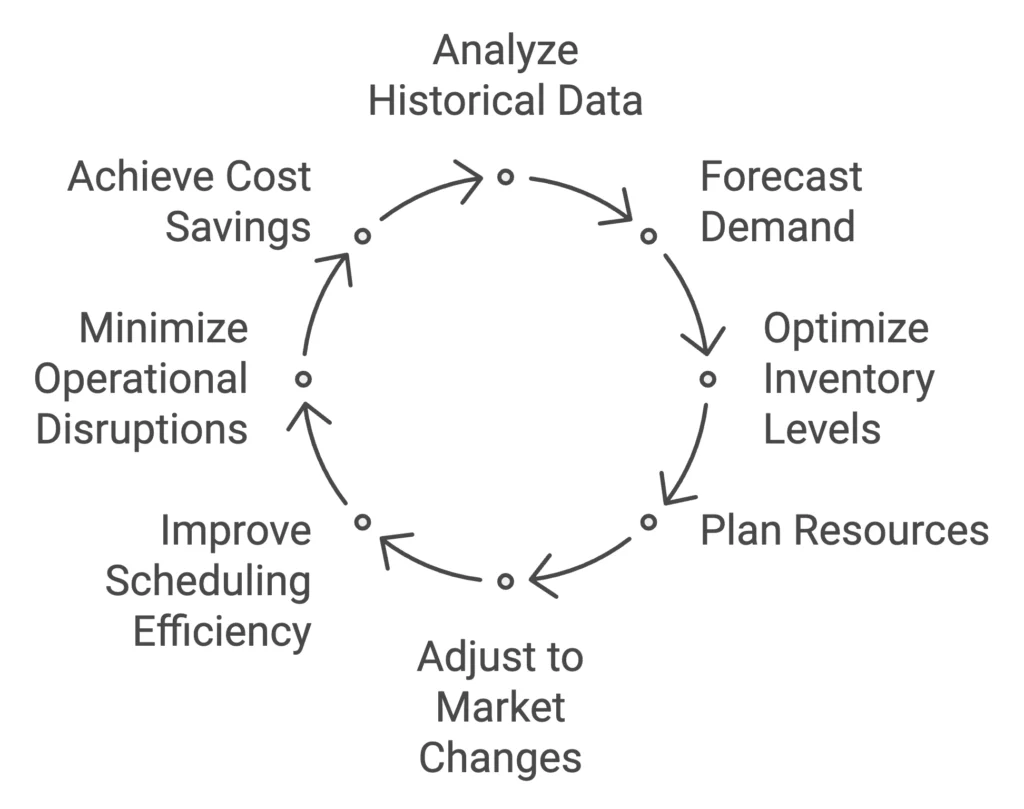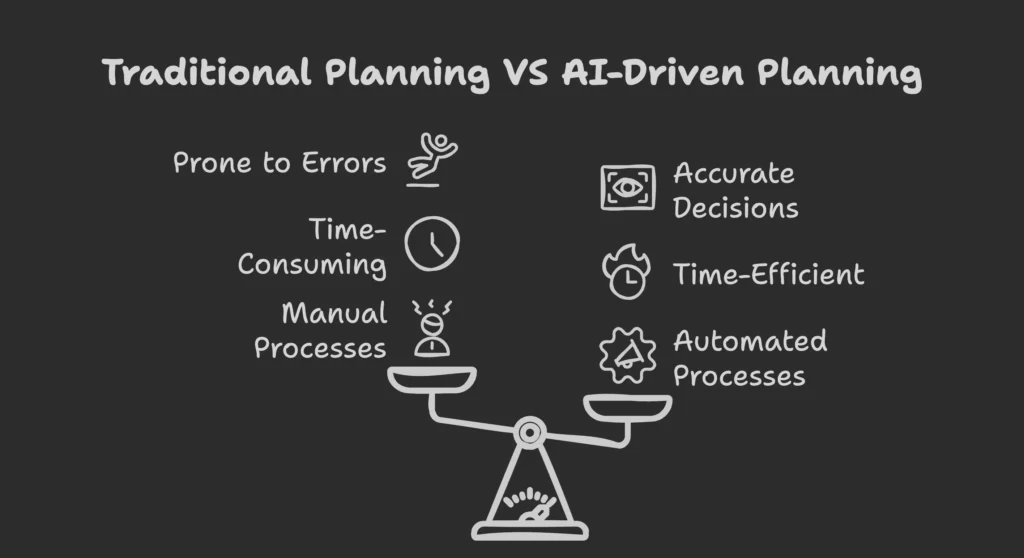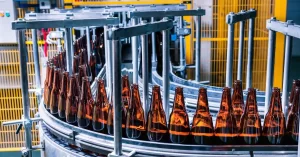AI is transforming production planning and scheduling in manufacturing, addressing traditional challenges like manual inefficiencies and inflexible processes.
By leveraging predictive analytics, advanced data processing, and optimization algorithms, AI enhances accuracy, efficiency, and real-time adaptation to market fluctuations.
Benefits include reduced downtime, optimized resource allocation, and improved sustainability. Implementation requires integration with existing systems and continuous learning from new data.
AI-driven solutions enable real-time optimization, inventory management, and competitive advantages through innovation. As the technology evolves, it promises further automation and responsiveness in manufacturing processes, paving the way for a more efficient and adaptive industry landscape.
Traditional Planning and Scheduling Challenges

The intricacy of production planning and scheduling in traditional manufacturing environments poses significant challenges that can impede operational efficiency and competitiveness. Traditional methods often rely on manual processes, making them time-consuming and prone to human error. This susceptibility to mistakes can disrupt operational efficiency and lead to suboptimal resource allocation.
One of the primary drawbacks of conventional approaches is their inability to process large volumes of data effectively. This limitation results in delayed decision-making and a lack of adaptability to real-time changes in demand or resource availability.
Furthermore, experience-based decision-making, while valuable, may not align with the complexities of modern manufacturing environments, hindering competitiveness and responsiveness to market dynamics.
Traditional scheduling systems struggle to handle sudden machine breakdowns and supply chain disruptions. Their lack of agility makes it difficult to quickly adjust plans and mitigate impacts, potentially leading to costly downtime and missed production targets.
Additionally, limited scenario planning capabilities reduce the ability to thoroughly evaluate risks and opportunities, resulting in inefficiencies and increased operational costs.
AI in Production Planning
Increasingly, AI in production planning is transforming manufacturing operations by leveraging advanced technologies to improve decision-making processes and optimize resource allocation. By utilizing predictive analytics and machine learning algorithms, AI systems analyze vast amounts of historical data to accurately forecast demand, enabling manufacturers to optimize inventory levels and minimize stock-outs.
These advanced systems excel in resource planning by identifying patterns and trends within large datasets, facilitating data-driven decisions that improve scheduling efficiency and resource allocation. Optimization algorithms powered by AI streamline manufacturing processes, improving scheduling accuracy and minimizing operational disruptions caused by unexpected changes.
One of the key advantages of AI in production planning is its ability to adapt to market fluctuations in real-time. By continuously analyzing current data and demand signals, AI systems can make instant adjustments to production plans, ensuring manufacturers remain agile and responsive to changing market conditions.
This adaptability, combined with the improved accuracy in demand forecasting and resource planning, contributes to significant cost savings and improved overall productivity in manufacturing operations. As a result, AI-driven production planning is becoming an essential tool for maintaining competitiveness in today’s complex manufacturing landscape.
Benefits of AI-Driven Scheduling
Through AI-driven scheduling, manufacturing operations gain considerable benefits that transform production processes. By leveraging machine learning algorithms to analyze historical data, AI-driven scheduling greatly increases accuracy, resulting in reduced production downtime and improved operational efficiency. This innovative approach optimizes resource allocation based on real-time data, enabling swift adjustments to equipment and material availability, thereby improving overall productivity.
The integration of AI with IoT facilitates continuous learning and adaptation of scheduling strategies, aligning production with fluctuating market demands. AI systems excel in processing vast amounts of data to identify patterns and trends, enabling proactive demand forecasting and improved inventory management. This capability reduces waste and improves cost-effectiveness.
| Benefit | Impact |
|---|---|
| Increased Accuracy | Reduced downtime, improved efficiency |
| Optimized Resource Use | Improved productivity, cost savings |
| Real-time Adaptability | Swift response to market changes |
| Improved Forecasting | Better inventory management, reduced waste |
Organizations implementing AI-driven scheduling solutions experience considerable operational cost savings and gain a competitive advantage through their improved ability to respond rapidly to changing production requirements. This transformative technology is reshaping the manufacturing landscape, driving sustainability and operational excellence.
Implementing AI Solutions

Successfully rolling out AI solutions for production planning and scheduling requires a strategic approach and careful integration with existing systems. The implementation process begins with the integration of advanced algorithms capable of analyzing historical data to generate accurate demand forecasts. This foundational step is vital for improving decision-making processes and augmenting overall operational efficiency.
A key advantage of implementing AI solutions is the significant reduction in time needed to generate production schedules, with some organizations reporting up to 96% improvement. This streamlining of operations minimizes manual intervention and allows for more agile responses to market fluctuations.
AI technologies leverage real-time data from various sources to optimize resources, ensuring that production schedules remain adaptable to changing conditions and resource availability.
For successful implementation, high-quality data and seamless integration with existing ERP and MES systems are essential. This integration enables effective collaboration between human expertise and AI capabilities.
As AI applications continuously learn from new data, scheduling accuracy improves over time, leading to increased operational efficiency and reduced costs in manufacturing processes.
Real-Time Optimization
Leveraging the power of AI algorithms, real-time optimization in production planning and scheduling enables manufacturers to adapt swiftly to dynamic market conditions and operational changes. This innovative approach allows for immediate adjustments to production plans based on current data, greatly improving responsiveness to unexpected fluctuations in demand or resource availability.
AI-driven algorithms process vast datasets at high speeds, creating near-optimal schedules that align with market conditions and equipment capacities. The integration of real-time data can reduce lead times by up to 96%, minimizing delays and maximizing resource utilization across manufacturing operations.
Additionally, predictive analytics within real-time optimization frameworks proactively identify potential bottlenecks and inefficiencies, leading to improved operational efficiency and reduced downtime.
The implementation of AI for real-time optimization in production scheduling contributes to improved customer satisfaction by ensuring timely delivery of products. Companies can quickly adapt to order changes and production disruptions, maintaining a competitive edge in the market.
This advanced approach not only optimizes resource usage but also fosters sustainability, driving long-term success in an increasingly complex manufacturing environment.
Future of AI Manufacturing
The future of AI in manufacturing promises a paradigm shift in production planning and scheduling. AI systems are poised to transform operational efficiency by automating production scheduling, potentially reducing downtime by up to 20% through predictive maintenance strategies.
Advanced Planning and Scheduling (APS) systems will leverage real-time data integration, enabling manufacturers to respond swiftly to market dynamics and optimize resources, with schedule generation accelerated by up to 96%.
A significant advancement in demand forecasting accuracy is anticipated, with AI-driven solutions potentially decreasing forecast errors by 30%. This improvement will lead to enhanced inventory management and waste reduction.
The integration of IoT with AI technologies will provide real-time production insights, facilitating adaptive scheduling that can adjust to sudden disruptions or changes in demand instantaneously.
Moreover, the future of AI in manufacturing will emphasize sustainability. AI-driven resource optimization will minimize waste, contributing to greener practices and ensuring compliance with environmental regulations.
This focus on efficiency and sustainability will not only reduce costs but also position manufacturers at the forefront of innovation in an increasingly competitive global market.
Conclusion
In the grand tapestry of manufacturing, AI-driven production planning and scheduling emerge as the master weaver, intricately intertwining efficiency and adaptability.
Like a skilled conductor orchestrating a complex symphony, these intelligent systems harmonize disparate elements of production, creating a masterpiece of operational excellence.
As the industry evolves, this technological virtuoso will continue to compose innovative solutions, transforming challenges into opportunities and guiding manufacturers through the labyrinth of global competition towards a future of unparalleled productivity and sustainability.
Not Sure How AI Can Help Your Business? Let’s Talk!

Ugnė Daniūnaitė
Business Development Manager
Book a no-obligation free consultation with our expert.



